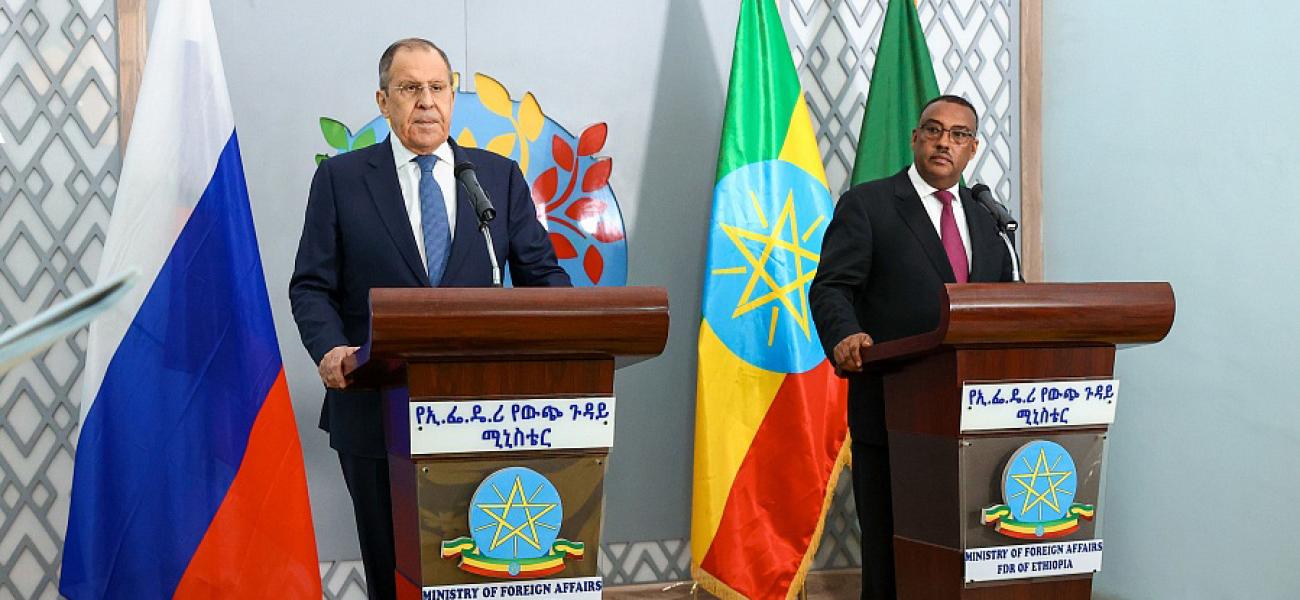In the Thick of It
A blog on the U.S.-Russia relationship
Is Russia Isolated? Condemnation of Its Invasion of Ukraine Isn’t Global
As the West’s increasing punitive measures bear down on Russia for its invasion of Ukraine, Russian Foreign Minister Sergei Lavrov is in Africa this week, trying to develop economic ties and rally political support from governments there. Why Africa? For one, the continent is forecast to become the world’s “next growth miracle.” As important, not one African country to date has imposed sanctions on Russia, and when Ukrainian President Volodymyr Zelensky addressed the African Union via videolink, only four African heads of state reportedly attended. While some analysts and Western officials claim that Russia is isolated, the inconvenient fact is that condemnation of Russia’s actions in Ukraine is far from universal. The U.N. resolution condemning Russia’s invasion of Ukraine was met with abstention or outright opposition from countries accounting for about half of the world’s population, while the resolution to remove Russia from the U.N. Human Rights Council was abstained from or opposed by nations representing a whopping 75% of the world’s population.
Claim: Russia is isolated.
- U.S. Secretary of State Antony Blinken: “There was a strong consensus and Russia was left isolated, as it has been many times since this war [began].” (RFE/RL, 07.09.22)
- Charles Kupchan, professor at Georgetown University: “Russia is isolated on the global stage in a way it’s never been.” (NYT, 07.20.22)
- Rui Soares, investment professional: “Putin’s Russia will become a pariah state.” (FT, 07.04.22)
Inconvenient Facts:
- On the U.N. resolution to condemn Russia’s invasion of Ukraine and demand its immediate withdrawal, states accounting for half the world’s population abstained or opposed. (Axios, 03.02.22)
- On the U.N. resolution to remove Russia from the U.N. Human Rights Council, states accounting for 75% of the world’s population abstained or opposed. These included: the world’s most populous country (China), the world’s largest democracy (India), three leading democracies in Africa (Algeria, two leading democracies in Latin America, and nearly every country in the Middle East.) (Axios, 04.07.22)1
For More:
- U.N. letter criticizing Russia’s invasion of Ukraine (Feb. 25)
- 87/193 countries were signatories. (Axios, 02.25.22)
- U.N. resolution to condemn Russia’s invasion of Ukraine and demand its immediate withdrawal (March 2)
- 141/193 countries voted to for the resolution.
- Notable opposition: Russia, North Korea, Syria, Belarus
- Notable abstentions: China, India, Iran, Pakistan, South Africa, Vietnam, Bangladesh (U.N. Digital Library, 03.02.22)
- Size matters: Countries abstaining from and opposing the resolution represent about 50% of the world’s population.2
- U.N. resolution to remove Russia from U.N. Human Rights Council (April 7)
- 93/193 countries voted to remove Russia.
- Notable opposition: Russia, China, Iran, Vietnam, North Korea, Algeria, Bolivia
- Notable abstentions: India, Brazil, South Africa, Indonesia, Mexico, Nigeria, Egypt, Ghana, Iraq, Malaysia, Pakistan, Saudi Arabia, Thailand (U.N. Digital Library, 04.07.22)
- Size matters: Countries abstaining from and opposing the resolution represent about 75% of the world’s population.
- Including:
- 9/10 of the world’s most populous countries
- World’s largest democracy (India)
- Largest democratic nation in South America (Brazil)
- 16/20 richest Asian countries (China, India, Indonesia, Saudi Arabia, Thailand, Bangladesh, Singapore, Philippines, Malaysia, Vietnam, United Arab Emirates, Pakistan, Iran, Iraq, Kazakhstan, Qatar, Kuwait)
- 9/10 largest African countries, including two largest democracies (Nigeria, Ethiopia, Egypt, Tanzania, South Africa, Kenya, Uganda, Sudan, Algeria)
- 4/10 of America’s top trading partners3 (Mexico, China, India, Vietnam)
- Every country in the Middle East except Israel
- Including:
Joshua Henderson is a researcher at the Harvard Kennedy School’s Belfer Center for Science and International Affairs, where he focuses on Chinese domestic policy, political economy and U.S.-China relations.
Footnotes
- For official voting records, see U.N. Digital Library.
- Here and elsewhere, for country population data percentages were calculated based on data from the U.S. Census Bureau’s International Database (IDB).
- As calculated by the U.S. Census Bureau.
The opinions expressed herein are solely those of the author. Photo by the Russian Foreign Ministry shared under a Creative Commons license.

